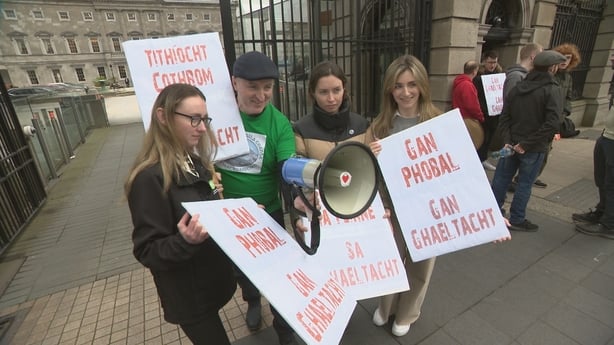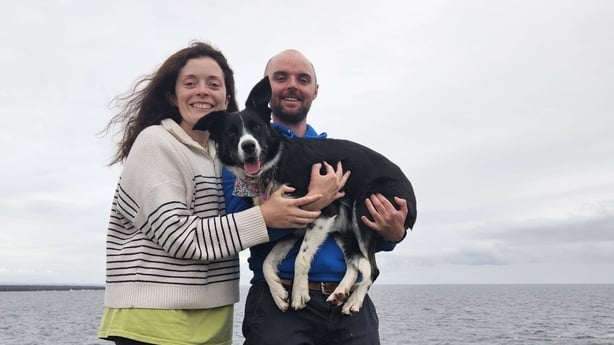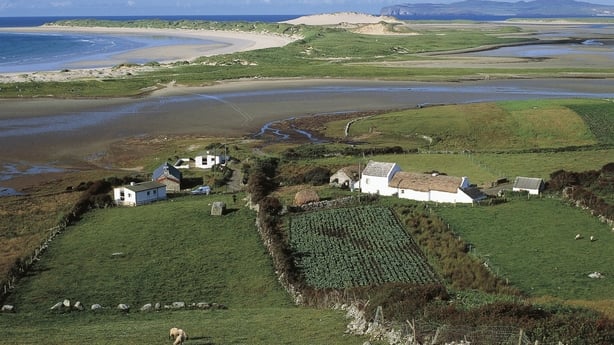In one respect, the issues facing Irish language speakers seeking accommodation in Gaeltacht areas are common to those in many other parts of the country, like soaring prices, a lack of rental properties and protracted problems in securing planning permission.
However, the recently formed Bánú group says the difficulties are becoming so pronounced that the longer-term viability of State-designated havens for Irish speakers is under threat.
It is arguing that the Government needs to intervene so that people who want to live, work and raise families in the Gaeltacht can be enabled to do so.
Aoife Ní Chonghaile is the chair of the organisation, which was formed on the back of a public meeting in Conemara late last year.

She says: "It started with an article by Adhna Ní Bhraonain on tuairisc.ie, when she wrote about the difficulties she was having getting a place to live, after moving back to her home area. Soon it was apparent that there were lots of people in the same situation."
Many of them were living with relatives. Others, watching on from abroad, want to move home but are being put off by the housing issues impacting tens of thousands of people in their 20s and 30s.
The scale of the shortage was evidenced by a quick search online in the days before their first meeting.
Between Bearna and Carna, four properties were available for rent, 197 others were listed in the same geographical area on AirBnB.
"We had nearly 100 people at our first meeting. Since then we've been looking at the things that need to be done and trying to formulate ideas on how best to resolve the problems" says Ms Ní Chonghaile.
"We’re trying to keep people living in the Gaeltacht, so Irish can be spoken. It’s a living language here and we want to keep it that way.
"The easiest way for me to define it is a desire to live near my family and be part of my community.
"I can do absolutely everything through Irish and I don't have to think twice about it. That's what it means to me.

"There’s also the future need, that children can have an education through Irish. There's no question about it, it’s a given. All those things are vital to protect what we have here."
After protesting outside Leinster House earlier this month, representatives from Bánú met Minister for Housing Darragh O’Brien during his visit to Galway this week.
Ms Ní Chonghaile says the organisation sought assurances that the Planning and Development Bill, which is now at Committee Stage in the Dáil, would include provisions specifically referencing the need for housing in Gaeltacht areas.
The representatives also gave the minister suggestions regarding the role the Department of the Gaeltacht or Údarás na Gaeltachta might play in alleviating the housing issues facing young people in such areas, whether through the provision of financial or logistical supports.
"We have a lot of momentum at present and we’re hoping to see some change in the next few months", says Ms Ní Chonghaile.
Noel Seoighe has first-hand experience when it comes to deciding to move back to the Gaeltacht. He moved home to Inis Mór in 2021, after spending four years in Dubai with his then fiancée, now wife, Tessa.
After deciding to return to Ireland, attention shifted to where they would locate. "The deal was that there was the bit of land here and I'd build her a house", says Mr Seoighe.
However, the process of securing planning permission was tortuously slow. The application was initially refused, due to issues with available depths for a septic tank.
Subsequent efforts to find a suitable location, with the requisite depth of 1m, were successful though, and last week approval was finally granted.
"It took two-and-a-half years but we're glad to be able to get moving on it now" says the secondary school teacher.
That's not to say there weren't some second thoughts.
"There was a while there where we were kind of at the stage 'is this going to happen or will we have to move elsewhere'."

Ultimately what Mr Seoighe calls the "grá for the island" triumphed and others with the same love may be encouraged by the eventual success of his endeavours.
While just three out of the 12 people who were in his class at school are living on Inis Mór currently, others are keen to return.
"A few of us met up over Christmas and there's definitely two or three others thinking about it," he says.
Mr Seoighe says anything that encourages islanders to come home and stay can only bring benefits, both for the language and the cultural traditions synonymous with the place.
The issues being experienced by Irish speakers in Galway are not unique to one Gaeltacht area.
Dónall Ó Cnáimhsí is the Language Planning Officer for Gaoth Dobhair, Rann na Feirste, Anagaire and Loch an Iúir, in Co Donegal.
These are areas where over 80% of the population aged three and over speak Irish, according to the 2022 Census.
But their status among the towns with the highest proportion of Irish speakers in the country is threatened by accommodation problems.
Mr Ó Cnáimhsí says that there are several reasons for a lack of available housing. These include "a multitude of short-term lets", holiday homes and the price of housing. The latter being accentuated by the former.
"There's a huge demand for property, in some areas going back to the 1970s, where there have been developments of holiday homes. Now more and more visitors are buying houses and sites on which to build," he says.
In many instances, these purchasers are well-resourced and able to outbid other buyers to secure their desired property,
He is hoping the new Planning Bill will see the Government renew its commitment to Gaeltacht areas by "making it as easy as possible for people to find housing".
Mr Ó Cnáimhsí says that in the absence of positive action "the average age of the communities is rising, as family members have to move elsewhere" and he's fearful of the domino effect this will have over the years.
He also suggests that greater flexibility in the system could ease the problems, saying rules about building near national routes, like the N56, could be eased if speed limits were reduced in certain areas to allow for access roads to sites suitable for houses.
And the role State agencies, like Udaras na Gaeltachta, could play is also being discussed by the groups seeking changes to the status quo.
Mr Ó Cnáimhsí says it has large land banks that could be used for housing, with a language condition for prospective tenants or purchasers.
Alternatively, he proposes that it apply to become an Approved Housing Body for the Gaeltacht, with a specific remit to address the issues of concern.
Central to this campaign is the desire to have a living, breathing community that can thrive into the future.
Mr Ó Cnáimhsí says there's huge potential to reinforce and grow the language by supporting the communities that safeguard it.
"All we need is a proactive approach to have all agencies working, to sustain a thriving Gaeltacht," he says.






